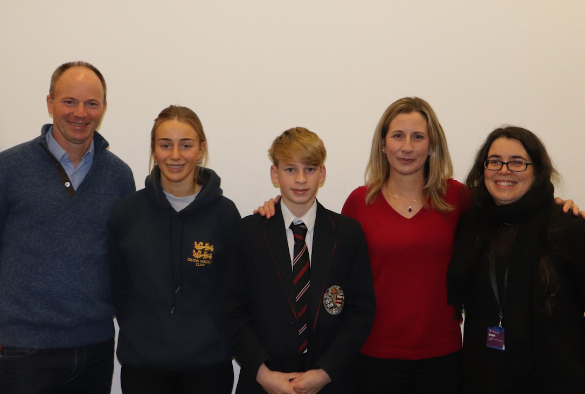Professor Ainhoa Mielgo celebrates inaugural lecture

This week staff and students gathered for Professor Ainhoa Mielgo’s inaugural lecture to celebrate her promotion to Professor of Cancer Biology.
Held at the Central Teaching Tub, Professor Mielgo’s lecture ‘How can cancer cells gain superpowers, and how can we stop them?’ highlighted her key discoveries in the field of cancer biology and their translation to find better treatments for cancer.
Ainhoa also gave a candid account of her career to date, including the challenges of raising a family whilst navigating a dual-academic relationship, working in the same field of research.
Having developed a fascination with the microscopic world as a child, Ainhoa carried out her BSc and MRes in biomedical sciences in Spain. During her MRes, Ainhoa developed an interest in cancer biology and so moved to the University of Basel, Switzerland to carry out a PhD in cancer biology. This was followed by post-doctoral training at the Moores Cancer Center at the University of California San Diego.
Ainhoa joined the University of Liverpool in 2013, having secured a prestigious Sir Henry Dale Fellowship, co-funded by the Wellcome Trust and Royal Society. This provided six years of funding and the opportunity to establish the Tumour Microenvironment Lab, which she co-leads with her partner in life and research, Professor Michael Schmid.
In addition to her research, Ainhoa developed the MSc in Cancer Biology programme and has driven the Institute’s sustainability agenda, both within the research laboratories and as part of the School of Biosciences’ curriculum review.
Professor Sonia Rocha, Executive Dean of the Institute of Systems, Molecular and Integrative Biology introduced Ainhoa’s lecture and praised her collegiality, commenting: "Ainhoa is an amazing role model as a scientist, not only offering mentorship in Liverpool but also at the University of Birmingham as part of the Academy of Medical Sciences’ SUSTAIN programme. I commend her incredible dedication and research ethos, which includes her desire to translate her science into real life applications."
Professor Mielgo commented: "The North West has the highest incidence and mortality rates for cancer in the UK and thus it is vital that cancer research is carried out here. The aim of our team is to understand the complex biology of cancer to find better treatments for cancer patients and at the same time train the next generation of cancer researchers."